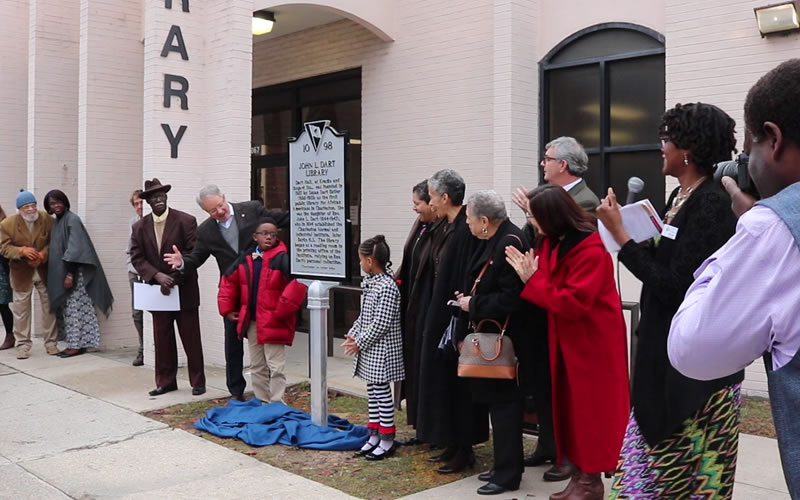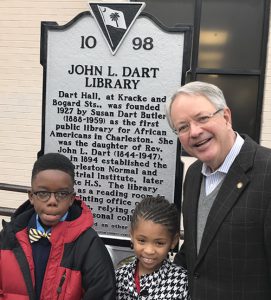
Charleston Mayor John Tecklenburg (center) unveils the memorial outside the Dart Library with two students. (CCPLphotos)
Staff reports | More than 60 people gathered Saturday to unveil a new historical marker to commemorate the formation of the Dart Hall Library 90 years ago in the northern part of Charleston. Today, the library is located on upper King Street in a building constructed in the late 1960s.
Onlookers clapped as Charleston Mayor John Tecklenburg and two students unveiled the marker, which was sponsored by the Charleston County Public Library. The anniversary event also featured special presentations including unveiling of a portrait of the first librarian, a poetry reading by artist Fouche Sheppard and an excerpt of a documentary showcasing the evolution of Dart Hall Library and the Dart Library of today.
The ceremony also included presentation of an indigo-dyed community rag quilt made from pieces of cloth tied together by more than 1,000 people, explained creator Sharon Cooper-Murray. Involved in the project was Enough Pie, a community nonprofit represented at the event by executive director Cathryn Zommer. In the recent past, the group also organized a mural on the outside of the library to remember a former Dart librarian, Cynthia Graham Hurd, who was a victim of the 2015 murders at Emanuel AME Church.
During opening remarks on Saturday, the Rev. Leonard O Griffin, pastor of Morris Street Baptist Church, where Dart also served as pastor, reflected that the library served for “90 years of bringing light into dark places.”
History of the Dart Library
In 1927, with a groundbreaking spirit and a commitment to literacy and community empowerment, the Rev. John L. Dart’s family opened the first free public library for African-Americans in Charleston, according to a CCPL press release. The Dart Library started as a reading room at the Charleston Normal and Industrial School, a school founded by Dart in 1894 to educate black children crowded out of the city’s segregated schools.

Tecklenburg with James Barr III, a student
at Joseph Pye Elementary School in
Ladson, and Lauren Sarah Wilder,
an Ashley Hall student.
Dart’s daughter, Susan Dart Butler, established the library, providing free access to her father’s extensive collection of books. Through her efforts, it became a community resource for music, politics and literacy. The Kracke Street library drew the attention of the Rosenwald Fund, which provided money to the community to establish a Free Library. When the Charleston Free Library opened in 1931, the Dart family leased the building to the county for $1 per year. The library’s collection grew to 3,600 books with three librarians, including Butler. In 1952, the county purchased Dart Hall, operating it as a library until 1968 when the current John L. Dart Branch Library opened at 1067 King Street.
Born in Charleston in 1854 as a free black man, Dart spent his life as a champion of change and civil rights. An educated man, Dart understood the economic and racial stratification of the time and believed education was a way to empower area blacks.
Valedictorian of his 1872 graduating class at Avery Institute, Dart went on to receive a master’s degree and became an ordained Baptist minister. He served as pastor of Morris Street Baptist Church for 16 years and Shiloh Baptist Church for 10 years.
Dart founded the Charleston Normal and Industrial School because the area’s black schools were overcrowded, and he strongly believed the city of Charleston should pay for the education of black children, just as it did for whites. Dart worked to convince city officials, and in 1911, the city began to fund the school, which became the basis for Burke Industrial School and the current-day Burke High School.
Although Dart died in 1915, the legacy of this distinguished educator, religious leader and philanthropist continues today at the John L. Dart Branch of the Charleston County Public Library system.
- Have a comment? Send to: editor@charlestoncurrents.com



 We Can Do Better, South Carolina!
We Can Do Better, South Carolina!
























